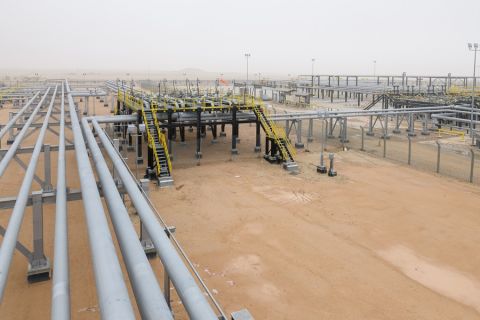
Australia's Northern Territory government has shot down a company's plans to use hydraulic fracturing to extract tight oil in the region.
Palatine Energy Pty Ltd., a privately held company, applied to explore in the Watarrka national park region four years ago, disclosing that it would need to use fracking methods to extract the tight oil contained in the permit.
Due to the introduction of new oil and gas guidelines, announced just last week, the company's four-year-old applications had been rejected, said David Tollner, the Northern Territory's mines and energy minister, in a statement on Nov. 24.
“Government recently implemented these new measures, on top of its already robust regulations, to ensure onshore oil and gas activities can proceed alongside other land usages in a safe and sustainable manner,” Tollner said.
Watarrka park, located about 320 km (199 miles) southwest of Alice Springs, contains three Aboriginal living areas and remains culturally significant to Aboriginal people. The area also contains more than 600 species of plants and numerous native animals.
“Both applications were assessed as not satisfying all of the recently announced criteria,” he added.
Under the new measures, the Northern Territory government will refuse to grant acreage release and exploration permits where there is a land use conflict based on a criteria that includes areas of intensive agriculture, high ecological value and cultural significance.
Tollner said the government understood the sensitivities associated with allowing exploration activities in the region and hadn’t taken the decision lightly.
He also took a swipe at the Central Land Council who had been vocal in its opposition to Palatine’s exploration plans.
“It is unfortunate that the Central Land Council chose to be vocal about the actions of the Northern Territory government before allowing proper processes to be undertaken to ensure all parties affected in this decision could be consulted,” Tollner said.
It is understood the decision to reject the application was announced on the same day traditional owners petitioned Federal Environment Minister Greg Hunt to step in and protect the land under commonwealth legislation.
Talking to Hart Energy in response to the decision, company managing director David Falvey described the move as profoundly disappointing.
“The department had supported the application,” he said.
“I’d spoken to the minister. I’d spoken to the head of petroleum at the department. No one ever flagged the serious possibility that it was going to be declined,” he said.
Falvey said the rejection of the permits had “everything to do” with the proposed new reforms and believed the Northern Territory government had not remained consistent in its decision, given the nearby Mereenie oil field has been fracked for about 30 years.
“This area was explored in the early 60s, it is not a virgin area,” he said. “We are not talking about a pristine environment.”
Falvey said he would be counting the cost of the government’s decision over the next few days as the company tally’s up how much money had been spent on early stage evaluation work.
“This was not an application that was done on trivial grounds,” Falvey said. “There was no doubt that there was oil there.”
Palatine has decided not to appeal the decision, meaning the company will walk away from its Northern Territory oil ambitions. Falvey said the company would now turn its immediate attention to the company’s licenses in Western Australia and Chile.
Lauren Barrett can be reached at lbarrett@hartenergy.com.
Recommended Reading
Shipping Industry Urges UN to Protect Vessels After Iran Seizure
2024-04-19 - Merchant ships and seafarers are increasingly in peril at sea as attacks escalate in the Middle East.
Paisie: Crude Prices Rising Faster Than Expected
2024-04-19 - Supply cuts by OPEC+, tensions in Ukraine and Gaza drive the increases.
Report: Freeport LNG Hits Sixth Day of Dwindling Gas Consumption
2024-04-17 - With Freeport LNG operating at a fraction of its full capacity, natural gas futures have fallen following a short rally the week before.
Permian NatGas Hits 15-month Low as Negative Prices Linger
2024-04-16 - Prices at the Waha Hub in West Texas closed at negative $2.99/MMBtu on April 15, its lowest since December 2022.
BP Starts Oil Production at New Offshore Platform in Azerbaijan
2024-04-16 - Azeri Central East offshore platform is the seventh oil platform installed in the Azeri-Chirag-Gunashli field in the Caspian Sea.


